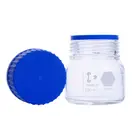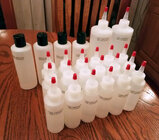Hi, I'm getting frustrated mixing my dang shellac. I've use pickle jars and they seem to maintain the seal for one or two batches then they are worthless. Tried a couple of plastic bottles, but you can't really see in em to see if it's dissolved yet. I'm thinking of ordering some mason jars but a) there are two kinds, two part lids and one part lids and b) I don't want to order them and find they don't work either.
So here I am, asking what y'all use. I usually dont make a whole lot, just 4-8 oz
Thanks
Raif
I've had a lot of problems with shellac and various shellac-based finishes not lasting very long at all. Couple of months, tops. I used to mix a fair amount of O.B. Shine Juice at a time, but in the long run, I found it only worked really well the first few times I used it, then it simply wouldn't shine. Didn't matter what I did.
So I started making micro batches. Enough for one thing at a time, basically, and stored these in very tiny bottles:
I still have a bunch of these left, but sadly this particular form is no longer sold on Amazon. Hoping I can find them elsewhere, as I prefer the yorker style bottles over the other styles that are available. In any case, I like these, as I can fill them to the brim, and put on the caps, which initially are non-punctured, meaning there is only a TINY big of oxygen in there. I've used these to store oils, including danish oil (a drying oil finish), and they have kept for a very long time doing that. Shellac can last for a while, but, the general idea with anything shellac based, is to just mix up what you need on demand, and never store it. If you DO have some left over, with these little bottles, its easy to squeeze out any excess air and seal them, and it will usually last longer that way, if necessary.
I generally try to avoid mixing much more than 2-3 of these at a time, which will usually work for a single project (unless its a rather large item, which is sometimes the case with platters, in which case I'll mix a 4oz or larger bottle as necessary with the knowledge I'm going to use it all right away.)



